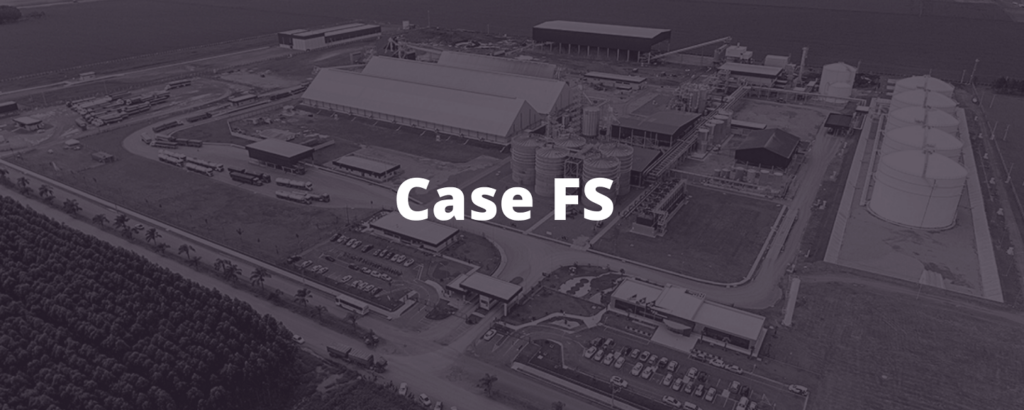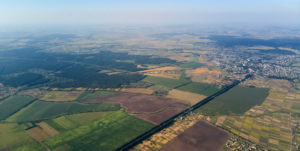In search of the state of the art in sustainability: FS invests in Agrotools technology and monitors more than 1.5 million hectares with digital intelligence
27 de September de 2021
Tempo de Leitura: 5 minutos
FS, the first and largest producer of ethanol in Brazil that uses 100% of corn in the manufacture of its products: ethanol, ingredients for livestock feeds (DDGS), corn oil and electric energy, has been increasingly demonstrating the sustainable benefits in production of low carbon bioenergy. Therefore, it became the first company in the sector to make commitments to the environment and society for the sake of agribusiness and to do good for the planet.
Ethanol, livestock feeds and bioenergy are produced 100% from corn and in a sustainable manner. More than 1.5 million hectares are monitored throughout Brazil, totaling 348 municipalities in 19 states. There are over three thousand registered and tracked territories. Raw materials, such as eucalyptus and bamboo have been planted in 40 thousand hectares. There are about 1,600 registered suppliers and customers. This is true for FS, a plant that manufactures high value-added products from corn.
FS, which is an advocate for processes that generate low impact on the environment, debunks the concept that the production of biofuel cannot be sustainable and works towards a future with less and less carbon emissions. Due to such actions, in 2020, the company received the RenovaBio seal, a national biofuel policy, which aims to establish annual national decarbonization targets, in order to encourage the participation of ethanol, biomass, biodiesel, biogas, among others, in the transportation energy matrix in the country.
To increase the efficiency of the production chain and data control, FS acquired the SAFE Digital Solution tool, from Agrotools, which ensures socio-environmental compliance of corn and biomass production, in addition to the sales of Livestock Feeds products.
SAFE also monitors whether customers comply with all legal obligations required by FS to become part of the company’s business partner portfolio.
The solution also makes it possible to authenticate suppliers both in the registry and in the georeferencing of the territory in which they operate. When a problem with a supplier is identified, FS uses Agrotools’ expertise for decision making. Likewise, it monitors livestock feeds customers: all of them need to comply with legal obligations – including environmental ones – to be able to buy from the manufacturer.
For FS CEO Rafael Abud, in addition to Safe having a deep knowledge of the sector, the experience in sustainability and the advisory support weighed in the choice of Agrotools as a partner. “The partnership between FS and Agrotools, with the implementation of the digital tool, is another step towards the implementation of technology that benefits agribusiness and the environment. Besides, we count on technical consultancy specialized in the market in which it operates”, says the CEO. “Therefore, we can say that Agrotools is an anchor in several initiatives, including the California Certification, the emission of green bonds and participation in financing linked to sustainability goals.”
Agrotools’ experience in the Amazon biome was another crucial point in establishing the partnership. “After more than ten years of intense studies and projects in the Amazon, Agrotools continues to innovate and anticipate trends, now in the corn ethanol industry”, says Sergio Rocha, CEO of Agrotools. “We prepared the Policy, Procedures and Technology device for FS, including the origination of corn and biomass, and the sale of DDGs (dry grains) for livestock feeds, focusing on the differentiation of its products and aiming at the recognition and benefits in the scope of green bonds.”
Making the difference
Until FS started its activities in 2014, corn was produced in the second crop in Mato Grosso, following the planting of soybeans, the state’s main summer crop. The production would generate high impacts on carbon emissions and burdened the government, which subsidized grain freight to the ports to find export channels.
Faced with this scenario, FS took on the responsibility of making a difference and prompted several internal moves to value second-crop corn. The outcome was higher productivity within the same areas and less impact from soil preparation.
With such an increase in production, a new challenge was met: how do they handle the volumes? Making use of its driving force and technological ability, it was then that FS opted for diversification and began to produce corn ethanol and other by-products, such as livestock feed, which is balanced and with high energy rate, encouraging the practice of confinement and reducing extensive farming.
Another FS X-factor is the source of clean energy used in its manufacturing units: unlike what happens in other countries, where sources such as natural gas or coal are used, the manufacturer uses biomass obtained from raw materials such as eucalyptus and bamboo.
“The FS is in the Cerrado, in São Lucas do Rio Verde (MT), with transposition to the Amazon biome, a vulnerable environment. But we demonstrated that, with the right investments and the use of technology, it is possible to find a business model that is aligned with the lowest carbon footprint”, says Abud. After making the difference, it was up to FS to show the novelty to the agribusiness chain. Once created and authenticated, the production model was presented to other stakeholders, such as representatives of the financial market, with clean finance appeal. The results were two immersions in the capital market and one bilateral transaction with a bank, always in line with ESG (Environmental, Social and Corporate Governance) goals and applying regressive interest rates. “This is the first step, but the alignment with financial institutions and recognition for what is being done is clear”, says the CEO. “We want to perpetuate our feedback, investing more and more in technologies such as those of Agrotools to follow the true vocation of Brazilian agriculture, producing more and more in a more sustainable way.”





